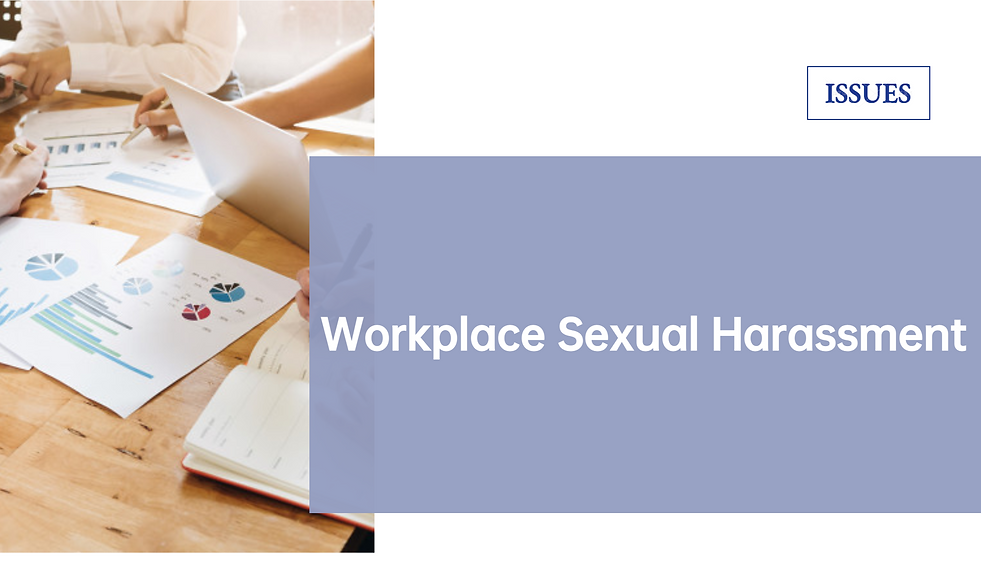.png)
Current Conditions
Sexual harassment refers to offensive physical and verbal behaviors of sexual nature. This includes teasing, unwelcoming comments about a woman’s sex, or offensive touching without consent. Sexual harassment is considered illegal but in the workplace, most people tend to avoid reporting these behaviors due to potential external pressure.
According to statistics, 54% to 81% of women experienced sexual harassment in the workplace. Most of them did not report their experiences. As more activities and campaigns occur to invoke awareness of workplace sexual harassment, an increasing number of women dare to say “no” to sexual harassment.
Impacts
Experiencing sexual harassment still brings permanent impacts on the victims’ life:
·Harms victims’ health conditions:
Victims who experience serious sexual harassment may have depression or post-traumatic stress disorder (PTSD). These mental problems affect the patient’s life in all aspects. The symptoms of mental diseases include severe anxiety, intrusive thoughts, or even physical sensations.
·Promotion opportunity and personal development problems:
Sexual harassment largely affects the victims’ understanding of their own development. 38% of women decided to leave their current company due to their experiences of sexual harassment. This can be influential to their career and future development.
The behaviors of victims might change, including becoming more introverted and unwilling to attend social activities, leading to a reduction in promotion opportunities. Furthermore, since the offender is the victims’ colleague or even supervisor, the victims who refuse the offenders might lose important working opportunities.
Suggestions to companies
·Workplace Policy
The company should make policies involving rules against sexual harassment. The human resource department should also be responsible to supervise the employees to protect the workers from sexual harassment. A complaint procedure should be set as a channel for the employees to call for help.
·Workplace Atmosphere
All the workers in the company are responsible to create a friendly atmosphere to encourage gender equality. Leaders at all levels should act as a model to avoid sexism in the workplace.
·I Hold educational activities
There should be educational programs at each time to promote gender equality. For example, the employees can watch educational tv shows or have games based on this theme.

现状:
性骚扰指的是具有攻击性的身体和语言行为。这包括取笑,对女性性别的不欢迎的评论,或未经同意的冒犯性触摸。性骚扰被认为是非法的,但在工作场所,由于潜在的外部压力,大多数人倾向于避免报告这些行为。
据统计,54% - 81%的女性在职场中遭遇过性骚扰。他们中的大多数人没有报告他们的经历。随着越来越多的活动和运动的发生,唤起对工作场所性骚扰的认识,越来越多的女性有勇气对性骚扰说“不”。
影响:
遭受性骚扰仍然会给受害者的生活带来永久性的影响:
·损害受害者的健康状况:
遭受严重性骚扰的受害者可能患有抑郁症或创伤后应激障碍(PTSD)。这些精神问题对病人生活的方方面面都有影响。精神疾病的症状包括严重的焦虑,侵入性的想法,甚至是身体上的感觉。
l
·晋升机会与个人发展问题:
性骚扰在很大程度上影响了受害者对自身发展的认识。
38%的女性决定离开现在的公司是因为她们经历过性骚扰。这可能会对他们的职业生涯和未来发展产生影响。
受害者的行为可能会发生变化,包括变得更加内向,不愿意参加社交活动,导致晋升机会减少。此外,由于施暴者是受害者的同事甚至主管,拒绝施暴者的受害者可能会失去重要的工作机会。
给公司的建议:
·工作政策
公司应该制定有关禁止性骚扰的政策。人力资源部门也应该负责监督员工,保护员工免受性骚扰。应建立投诉程序,作为员工寻求帮助的渠道。
·工作氛围
公司所有员工都有责任营造一种鼓励男女平等的友好氛围。各级领导都应该以身作则,避免职场性别歧视。
·举办教育活动
每个时间段都应该有促进性别平等的教育项目。例如,员工可以观看教育电视节目或基于这个主题的游戏。